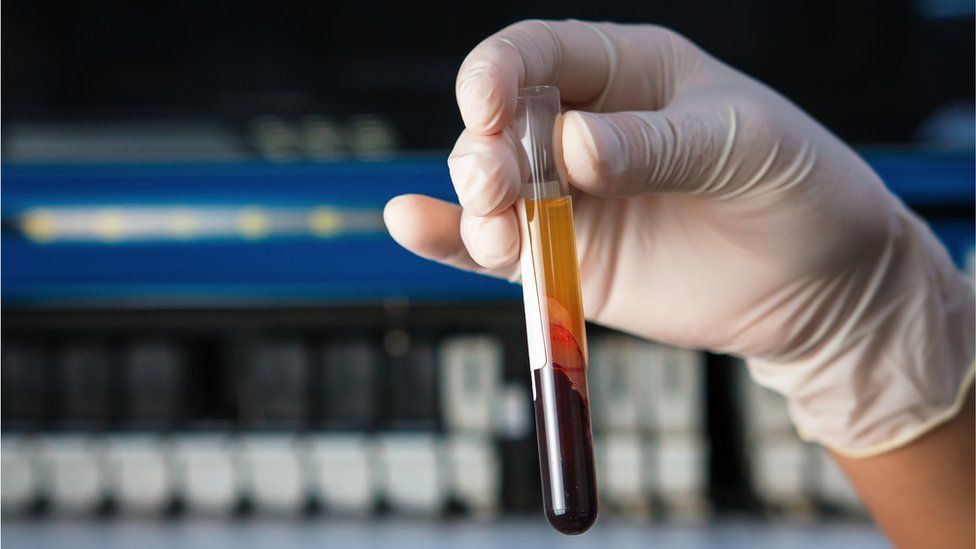Cancer: Blood test for 50 types to be trialled by NHS
- Published
- comments

A blood test designed to detect more than 50 types of cancer at an early stage will be trialled by the NHS.
More than 165,000 people in England will be offered the tests from next year. If successful, the NHS hopes to expand it to 1m people from 2024.
Sir Simon Stevens, NHS England chief executive, said early detection had the potential "to save many lives".
While some welcomed the pilot, others cautioned the test was still untried and untested.
Developing a blood test for cancer has been keeping scientists busy for many years without much success.
Making one that's accurate and reliable has proved incredibly complex - the danger is that a test doesn't detect a person's cancer when they do have it, or it indicates someone has cancer when they don't.
This test, developed by the Californian firm Grail, is designed to detect molecular changes in the blood caused by cancer in people with no obvious symptoms.
As part of a large-scale pilot, also funded by the company, 140,000 participants aged between 50 and 79 will be asked to take the tests for the next three years.
Another 25,000 people with possible cancer symptoms will also be offered testing after being referred to hospital in the normal way.
Lesley Maiden was diagnosed with pancreatic cancer seven months after she was first told there was something wrong with her pancreas.
Her sister, Sue, says an earlier diagnosis at an earlier stage of the cancer might have given her a better chance.
"I can't say that it would have saved her life - I will never know, but it might have extended her life.
"Maybe she could have had a few years of good, quality life," Sue says.
Instead, her cancer was too advanced to allow her to be part of a clinical trial and surgery was no longer an option.
Lesley died eight months after her diagnosis on Christmas Day 2018, aged 63.
The aim is to increase the number of cancers diagnosed at stage one or two, from half to three-quarters by 2028.
Tumours in organs such as the pancreas and ovaries are often diagnosed at a late stage, making treatment far more difficult and reducing survival rates.
The NHS hopes the blood tests will help increase five-year survival rates for cancer, which are below the levels seen in many other high-income countries.
"This promising blood test could therefore be a game-changer in cancer care, helping thousands more people to get successful treatment," Sir Simon said.
Cancer Research UK said large research studies of tests were "essential for determining if they're effective, and a vital step in getting them to patients, if proven to work".
"All too often, people are diagnosed with cancer at a late stage, when their disease is more difficult to treat," said Michelle Mitchell, the charity's chief executive.
"This is a human tragedy, not just in terms of lives lost, but it also means more expensive treatments, hospital stays and monitoring."
But Prof Paul Pharoah, professor of cancer epidemiology, University of Cambridge, said that the NHS "should not be investing in such a test before it has been adequately evaluated in well-conducted, large-scale clinical trials."